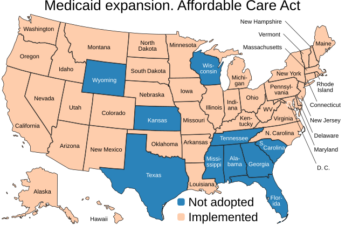
Some States Already Are Targeting Birth Control
By: Michael Ollove
Stateline
Last year, conservative Republicans in the Missouri legislature took a run at blocking Medicaid funding from going to Planned Parenthood, a frequent and prominent target of anti-abortion activists and politicians.
But in the fine print of their measure, those Republicans revealed that their ambition wasn’t only to target a familiar abortion foe. They were going after specific forms of birth control as well, notably, emergency contraceptives, often sold under the brand name Plan B, and intrauterine devices, known as IUDs. GOP lawmakers tried to stop Missouri’s Medicaid agency from paying for those forms of contraception.
Missouri state Sen. Paul Wieland, one of the Republicans who led that effort, explained his position this way: “The bottom line is there is only one time something definitively happens and that’s the moment of conception. Once that happens, anything that happens should not be state funded.”
Wieland and his allies failed, mostly because they tried to attach their measure to a must-pass bill extending a tax on hospitals that helps pay for the state’s Medicaid program, which provides health care for low-income Missourians, including children.
Many advocates on reproductive health issues think U.S. Supreme Court Justice Samuel Alito’s draft opinion overturning Roe v. Wade will further fuel some conservatives’ efforts to limit access to birth control. Although Alito specifically said in the draft that the ruling would not pertain to other rights courts also grounded in privacy, activists worry opponents will marshal his argument on privacy to attack birth control or gay marriage, for example.
And as the Missouri episode demonstrated, skirmishing over birth control methods already has begun, as Republican lawmakers push to restrict access to birth control methods they claim are abortifacient, or causing abortions.
Emergency contraception, often known as the morning-after pill and sold over the counter without a prescription, is designed to prevent ovulation. In its labeling, the Food and Drug Administration says emergency contraception also could keep a fertilized zygote from implanting in the uterine lining, though theAmerican College of Obstetricians and Gynecologists says the evidence suggeststhat situation is “unlikely.” Nearly 25% of women ages 22 to 49 have used emergency contraception, according to the U.S. Centers for Disease Control and Prevention.
IUDs, implanted in the uterus by a health provider, are a semi-permanent birth control method. They also prevent fertilization, but in some cases may prevent implantation. About 6.1 million women used IUDs over a one-month survey period in 2018, the same number as those relying on male condoms, according tothe Guttmacher Institute, an abortion rights advocacy and research organization.
This month, Idaho state Rep. Brent Crane, Republican chair of the powerful House State Affairs Committee, said he would hold hearings on legislation banning emergency contraceptives and possibly IUDs as well.
A Louisiana House committee earlier this month passed a bill saying that “human personhood” begins at the point of fertilization, an interpretation that critics say could potentially be used to outlaw Plan B drugs, IUDs and perhaps other forms of birth control.
Democratic Gov. John Bel Edwards, who opposes abortion, promised that if the measure passed, he would veto it. In its original form, the bill would have allowed criminal charges to be brought against those undergoing abortions. After the House voted to amend the bill to remove the parts that would have criminalized abortion recipients and outlawed some forms of birth control, the bill’s sponsor refused to advance it, according to the Louisiana Illuminator.
Those developments are in addition to actions some red states have taken trying to curtail family planning funding to certain reproductive health centers, which could limit access to birth control, particularly for low-income women, and to block legislative measures that would make contraceptives more accessible.
As it is, according to the organization Power To Decide, which helps guide people to available birth control, more than 19 million lower-income women of reproductive age who need publicly funded birth control live in areas without easy access to health centers offering a full range of contraceptive methods.
Those working in reproductive health think the battle over birth control is only beginning.
“There are many at the political extreme who equate birth control with abortion,” said Michelle Trupiano, executive director of the Missouri Family Health Council, a private nonprofit that administers federal funding for family planning services in the state. “The attack on the full range of reproductive health care is going to continue.”
Stigmatizing Birth Control?
Some lawmakers on the right regard some forms of contraception not as birth control, but as abortifacients, a view reproductive rights advocates forcefully resist.
“At the state level over the last couple of years, we’re seeing some legislators conflating birth control and abortion, especially certain methods, and attempting to stigmatize birth control,” said Mara Gandal-Powers, director of birth control access and a senior counsel at the National Women’s Law Center, an advocacy organization advancing gender equality. “This isn’t a future problem. It’s a now problem.”
Wieland, the Missouri state senator, is among those with a wide view of what birth control methods might constitute abortion. He pushed last year for the measure that would have prevented Missouri Medicaid from paying for Plan B and IUDs.
“I believe life begins at conception,” Wieland said in an interview with Stateline. “Anything that destroys that life is abortion, it’s not birth control. [I have] no problem with stopping sperm and egg from connecting, but when that does happen, that is life.”
Plan B, an emergency contraception, is distinct from abortion medication, which is taken after pregnancy is established.
Still, some anti-abortion advocates target those emergency contraceptives and IUDs as, in their view, possibly preventing implantation of fertilized eggs, and therefore potentially capable of causing abortions. It’s on that basis that the group Students for Life of America successfully lobbied this year against a measure in the Illinois legislature that would have required public universities to provide vending machines that dispense emergency contraceptives.
“It could destroy the life of a newly created human being if fertilization has occurred,” said Lauren Enriquez, the deputy media strategist with the national organization.
Wieland and Republican colleagues in the Missouri House this year stopped two measures that women’s reproductive advocates say would have increased access to birth control. One would have authorized pharmacists to prescribe and dispense some forms of contraceptives, such as birth control pills and the patch. The other would have required insurers to cover a 12-month supply of oral contraceptives at once rather than the typical one- or three-month supply, a practice that advocates say diminishes the likelihood of unplanned pregnancies. Neither bill got any traction.
Wieland said he opposed both measures because they would have created policies that pertained to just one form of medication. On the pharmacy bill, he said, “I don’t care if it’s birth control pills or heart disease or diabetes, I think those are decisions for doctors only. It’s a scope of practice issue.”
As to his opposition to the extended supply of birth control pills, he said, “There’s no other prescription that we give them with a one-year refill. This was going into uncharted territory, and that’s why it never made it out of committee.”
A number of other generally Democratic-leaning states, have enacted laws to enhance access to birth control, including the pharmacist and extended supply measures, but also new requirements that insurers provide broad coverage of control methods.
Title X Family Planning Funds
Reproductive rights advocates say the Trump administration, in its open hostility toward abortion, also effectively reduced access to birth control in states.
In 2019, the Trump administration adopted new rules blocking Title X family planning funding from going to providers who also offered abortion services or referred patients for abortions. The rules expelled many providers, notably Planned Parenthood, prompting some to close and eliminating for many patients access to the full range of reproductive health services.
The administration directed funding elsewhere, including in some cases to health centers that didn’t provide full birth control services, instead emphasizing abstinence and use of the rhythm method.
Even after the Biden administration took over, signaling the likely rescinding of the policy change, which occurred in October, some states tried to preserve the changes made under Trump. In Missouri, for example, the health department this year applied to be the recipient and distributor of Title X funding in the state, although the Missouri Family Health Council has been the state’s grantee for 40 years.
“We did have concerns, because the state has repeatedly and in numerous ways tried to limit and restrict funding to Planned Parenthood, and they said they were applying to make sure none of the funding went to them,” Trupiano said. This spring, the Biden administration awarded a five-year grant to the council.
The Biden administration also outmaneuvered the majority-Republican Montana legislature when the administration made the Title X grant for the state to Bridgercare, a nonprofit in Bozeman that provides reproductive health services. The Montana legislature had tried to direct funds elsewhere in an attempt to keep money from Bridgercare and Planned Parenthood.
Even with a friendly administration in Washington, D.C., advocates for reproductive rights in the states are far from reassured. When Crane, the Idaho state representative, announced earlier this month he would hold hearings to consider banning not only medication abortion, but also emergency contraceptives and IUDs, it set off flashing red lights for many. He later clarified that he wouldn’t target IUDs.
Idaho House Assistant Minority Leader Lauren Necochea, a Democrat, described Crane’s comments as “our worst fears realized.” His remarks came shortly after the Republican majority killed a measure that would have required insurers to approve six months of birth control without the need for a new prescription.
It continues what Necochea regards as the Republicans’ “harsh opposition to family planning access,” which also includes their opposition in 2018 to extending Medicaid family planning services to more low-income women in the state.
Crane did not respond to a request for comment.
Stateline, an initiative of The Pew Charitable Trusts.


